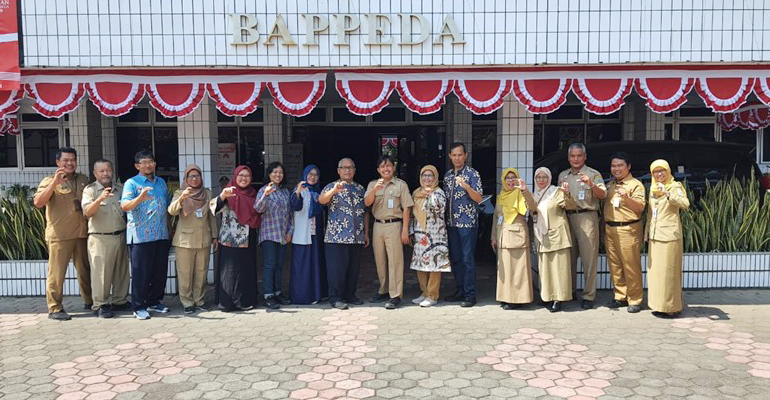Department of PSP IPB University Establishes Cooperation with Kebumen Regency Government for Village Assistance

A number of IPB University lecturers from the Department of Fisheries Resource Utilisation (PSP), Faculty of Fisheries and Marine Science (FPIK) are exploring cooperation with the Kebumen Regency Government (Pemkab) for village assistance in the context of community service programmes (PPM). They are Prof Tri Wiji Nurani, Dr Iin Solihin, Dr Darmawan, Dr Sugeng Hari Wisudo, Dr Retno Muninggar, Julia Eka Astarini, SPi, MSi, Prihatin Ika Wahyuningrum, SPi, MSi.
“Village assistance is designed as a sustainable community service programme. The service programme will be prepared through an assessment of potential and needs to overcome problems in the village. There are two villages that will be used as PPM locations, namely Tanggulangin Village and Jogosimo Village,” said Prof Tri Wiji.
Dr Darmawan said the assistance would involve various parties such as non-governmental organisations (NGOs). “The village is the subject, not the object. We will also collaborate with local universities, so we can collaborate more,” he added.
The Secretary of the Regional Planning, Research and Development Agency (Bappeda) of Kebumen, Dr Bahrun Munawir, welcomed IPB University’s plan to develop the potential in his region. In the future, not only the activities of the Real Work Lecture-Thematic (KKN-T) as has been done a few months ago, but it can be directed to the activities of Merdeka Learning Campus Merdeka (MBKM) students for six months.
“Lecturer service activities for village assistance need to be carried out from upstream to downstream. Later, IPB University can collaborate with the Technical Implementation Unit (UPTD),” explained Dr Bahrun.
Afifah Indrawati, MM, Secretary of the Education, Youth and Sports Office of Kebumen Regency, appreciated the KKN-T activities carried out by IPB University. An understanding of fisheries has been included in the local content of the junior high school curriculum, namely for fisheries cultivation. She suggested that in the future, it could be added to the understanding of marine potential for schools in coastal areas.
On that occasion, Moch Ashari, APi as Head of Capture Fisheries Division, Marine Environment and Fisheries Agency (DLHKP) conveyed the condition of marine fisheries in Kebumen Regency. There are eight sub-districts in Kebumen Regency whose areas directly face the sea, with a coastal length of 63.53 km.
“There are different characteristics of fisheries in southern Kebumen, namely wetan Suwuk and kulon Suwuk. Wetan Suwuk is open water, where fishermen land fish in river waters, such as at the Rowo and Tanggulangin Fish Auction Sites (TPI),” explained Moch Ashari.
Kulon Suwuk, on the other hand, is coral reef water, with fishing activities in a slightly sheltered bay. Fisheries activities in Kulon Suwuk have developed well, including at TPI Pasir, Karangduwur, Argopeni and Logending Beach Fishing Port (PPP).
“Fisheries activities are prioritised to protect the environment from damage in order to preserve fish resources. Combining tourism with fisheries is an option. The two villages that will be used as PPM IPB locations are very appropriate for culinary tourism,” he added.
Previously, the Secretary of Bappeda had recommended Kebumen’s marine fisheries potential to be included in the local content curriculum of schools in coastal areas. The PSP Department of IPB University is expected to create interesting modules related to the sea and the utilisation of fishery resources for PAUD, SD, SMP and SMA levels.
Dr Iin Solihin as the facilitator of the discussion concluded that some of the activities that need to be designed are students entering the village as an MBKM program, local content curriculum for marine use and management and interactive fisheries modules for fishermen education.
“We will combine fishing with tourism, for example crab fishing with other activities. The Kampung Nelayan Maju programme in Pasir Village can be an example,” Dr Sugeng added.
The activity continued with field observations and discussions with the village head, village authorities and turtle conservation community groups. The head of Jogosimo Village expressed the importance of the village as the spearhead of the ministry’s activities.
“Especially for fisheries, the life of fishermen in Kebumen is highly influenced by the season. Except for fringe fishermen who can catch fish all the time. Jogosimo and Tanggulangin have untapped potential in the sea and rivers,” said the Jogosimo village head. (TWN/Rz) (IAAS/RUM)



